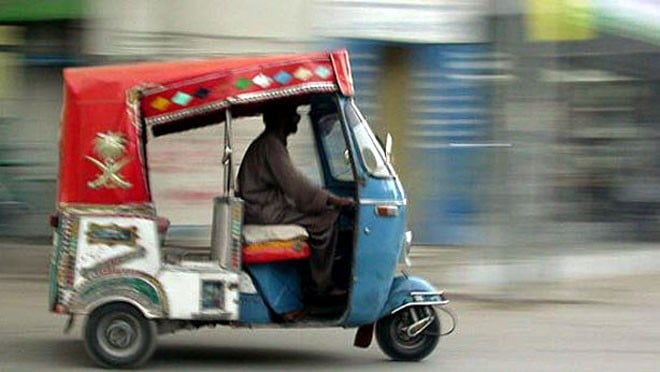
I underestimated how well-networked and easily available rickshaws were until they became a part of my daily travels

My first real rickshaw ride -- you know, the one you take when you’re not 6 years old anymore -- pretty much paved the way for me to re-discover the experience.
Sliding over the plastic seats expecting my hair to fly away in the direction of the wind while actually spewing out dust and Carbon Monoxide, in the smouldering heat, but eventually ending up where I needed to be with a few almost-accidents along the way, is how I would describe most of my rickshaw journeys.
At the expense of sounding completely naïve, I was fairly convinced that we possessed no extensive and dependable public transport system. The Metro Bus runs a vastly general route, as do buses. There are hardly any taxis on the road for public use, thanks to the ‘Apna Rozgar’ Yellow-Cab scheme, and walking long distances is simply not feasible. In other words, I underestimated how well-networked and easily available rickshaws were until they became a part of my daily travels.
Rickshaws can be found anywhere from relatively posh localities such as Defence and Gulberg to the narrow streets of Icchara and Samanabad. With comprehensive knowledge of routes and shortcuts and the ability to travel in cramped streets, they can land you just about anywhere you want to go.
Some are more spacious and revved up than the others and can be travelled in privately or with more people going to the same area. While rickshaws aren’t known to be the safest of all forms of transport, the Lahore Transport Company carries out inspections and issues monetary fines to rickshaws, ensuring that those on the road are in good condition and do not pose a harm to their passengers and other vehicles around.
Similarly, the Environment Protection Department aims to make them more environment- and consumer-friendly. Rickshaws fall under the informal sector, whereby individuals are able to earn a livelihood for their families without age restrictions and formal working hours. They are the only option for travel for people with disabilities, medical conditions, specific destinations and time restrictions.
Amidst all of this, they contribute to our culture and humour us with wittiest of lines written at their back. (Who can forget ‘Speed meri jawaani, overtake mera nakhra’?!)
However, whether or not they are truly as reputable as I initially thought them to be is a question I still don’t have a definite answer to. Rickshaw travel comes with many restrictions and negatives. For starters, there is no fixed way to determine the fare. Since they aren’t government regulated at, let’s say, X amount per kilometre nor are they fitted with metres to determine mileage and then calculate the charges, the fare usually just depends on how good you are at haggling, how familiar you are with the rates charged in general, and the mood of the driver.
At many instances, you find yourself being dropped for another customer willing to pay more or forced to pay a greater amount than normal because the rickshaw-driver (mafia) is all charging a similar, non-negotiable amount.
Moreover, they, like most public transport options available, are gender-biased and pose a threat to individuals and their freedoms. Rickshaws have been found to aid cases of kidnapping and rape, often linked to larger gang violence. In light of which, many women I know travel in groups and never alone, cancel evening plans due to the possibility of having to return home late in a rickshaw, and alter everything from their attire to their behaviour during a journey.
For those who don’t posses private transport, even doing grocery becomes a tedious task as they are constantly engaged in a battle between their well-being and their freedoms, where one comes at the expense of the other and the possibility of leaving your hair open and having passersby jeer at you, or worse, leaves you choosing to put it in a bun.
Constant daily struggles like these alter our decisions and garb our persona, so much so that my friends, who mainly travel in rickshaws, were the first to ask me about The Pink Rickshaw initiative, its operations and routes.